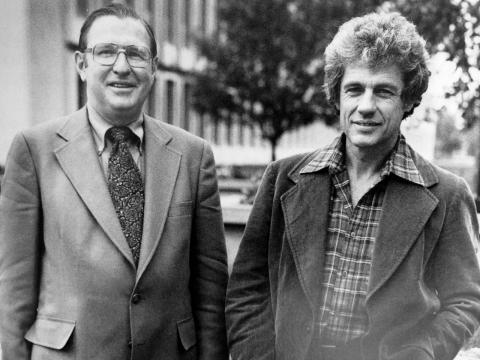
Part of the James Blue Tribute, excerpts from “Who Killed the Fourth Ward?” and Invisible City” will be shown on Wednesday, March 12 at 7 p.m.
EUGENE, Ore. -- (February 28, 2014) –Schnitzer Cinema, continuing the six-month James Blue Tribute, screens excerpts from James Blue’s two final documentaries on Wednesday, March 12, at 7 p.m. Blue’s co-director, Brian Huberman, and co-producer, Ed Hugetz, will present, via Skype, excerpts from “Who Killed the Fourth Ward?”(1978) and “Invisible City” (1979). Both films are examples of “The Complex Documentary,” the participatory, socially engaged mode of production Blue espoused and practiced late in his career.
Curated by Richard Herskowitz, director of Cinema Pacific, and cosponsored with the Cinema Pacific film festival, Schnitzer Cinema screenings are free and include free popcorn and soda.
“Who Killed the Fourth Ward?” is a three-hour documentary, whose opening 40 minutes will be screened. Blue, Huberman, and Hugetz dramatized the city of Houston’s acquisition of an historic Afro-American church for commercial expansion on the edge of the business district. The Fourth Ward is one of the oldest and most culturally significant black communities in Houston, Texas. In the 1970s, the city along with big business interests planned to redevelop the community in order to revitalize the dilapidated real estate and revitalize the image of downtown Houston. The film features encounters with elected city officials, businessmen, and the people of Fourth Ward, in order to better understand how a city like Houston works.
“James Blue’s journey into the Fourth Ward provides a series of experiences for the audience to access this strange world,” writes co-director Huberman of the film. “It can be a scary journey when Blue is put on the spot by challenging questions about, poverty, failure and race.”
Blue made “Invisible City” with Adele Santos, a renowned architect then at Rice University, whose students had researched the film. The problem addressed was the decay of Houston’s housing stock, and the film includes real-estate officers, builders, heads of city housing agencies, and the poverty-level renters of the properties. The “Invisible City” was conceived as a televised dialogue across five public TV programs: its audience could express themselves regarding its subject and influence the concluding film.
According to Blue’s colleague Gerald O’Grady: “The complex documentary began with a concern for and a commitment to changing a particular situation in an urban culture in which Blue himself lived. It was not to take a side but to explore all the facts in their complexity, and to research the problem in books and interviews and consultations with as many citizens from every strata involved in the issue, either as manager or victim.”
“It also enabled him to utilize a fictional genre of television, such as that of the investigative detective Columbo, as a narrative in which he himself, as the filmmaker, could perform the role of detective, so that the work became more of a story than an essay, and thus engaged a wider audience,” O’Grady continues.
In April, Schnitzer Cinema will conclude The James Blue Tribute, and open the Cinema Pacific film festival, with “Kenya Boran” (1974) on April 23 at 7 p.m., presented by the renowned ethnographic filmmaker David MacDougall, Blue’s co-director on the film.
The James Blue Tribute honors University of Oregon alumnus James Blue, an independent filmmaker renowned for his socially engaged documentaries and teaching. The six-month program includes screenings, guest speakers, and panels as well as publications and websites produced by UO faculty and students. Cinema Pacific and the JSMA’s James Blue Tribute is supported by a JSMA Academic Support Grant, and is cosponsored with the Clark Honors College, UO Libraries, and the UO Cinema Studies Program.
About the Jordan Schnitzer Museum of Art
The University of Oregon's Jordan Schnitzer Museum of Art is a premier Pacific Northwest museum for exhibitions and collections of historic and contemporary art based in a major university setting. The mission of the museum is to enhance the University of Oregon’s academic mission and to further the appreciation and enjoyment of the visual arts for the general public. The JSMA features significant collections galleries devoted to art from China, Japan, Korea, America, Europe and elsewhere as well as changing special exhibition galleries. The JSMA is one of six museums in the state of Oregon—and the only university museum--accredited by the American Alliance of Museums.
The Jordan Schnitzer Museum of Art is located on the University of Oregon campus at 1430 Johnson Lane. Museum hours are 11 a.m. to 8 p.m. Wednesdays, and 11 a.m. to 5 p.m. Tuesdays and Thursdays through Sundays. Admission is $5 for adults and $3 for senior citizens. Free admission is given to ages 18 and under, JSMA members, college students with ID, and University of Oregon faculty, staff and students. For information, contact the JSMA, 541-346-3027.
About Cinema Pacific
Cinema Pacific is an annual film festival based at the University of Oregon in Eugene that is devoted to discovering and fostering the creativity of international films and new media from Pacific-bordering countries, including the U.S. Through onsite and online presentations, the festival connects stimulating artists and ideas with a diverse public, furthering our understanding of world cultures and contemporary issues. The 2014 Cinema Pacific featuring FOCUS: TAIWAN and FOCUS: CHILE is APRIL 23 - 27, 2014.
About the University of Oregon
The University of Oregon is among the 108 institutions chosen from 4,633 U.S. universities for top-tier designation of "Very High Research Activity" in the 2010 Carnegie Classification of Institutions of Higher Education. The UO also is one of two Pacific Northwest members of the Association of American Universities.
Contact: Debbie Williamson Smith, 541-346-0942, debbiews@uoregon.edu
Links: Jordan Schnitzer Museum of Art, http://jsma.uoregon.edu
Cinema Pacific, http://cinemapacific.uoregon.edu/
- Log in to post comments






